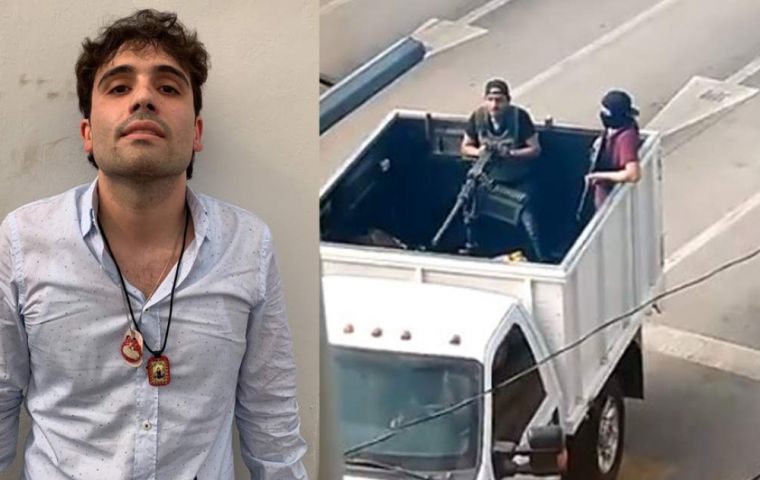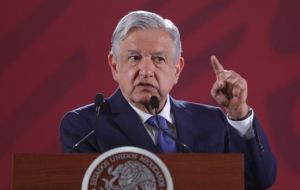MercoPress. South Atlantic News Agency
Who runs the country? Drug cartels outshoot Mexican military who back down on presidential orders
 Ovidio Guzmán López, sometimes known as “El Chapito,” is being sought for extradition to the U.S. to face drug trafficking charges
Ovidio Guzmán López, sometimes known as “El Chapito,” is being sought for extradition to the U.S. to face drug trafficking charges  “The capture of one criminal cannot be worth more than the lives of people,” Lopez Obrador said during a news conference
“The capture of one criminal cannot be worth more than the lives of people,” Lopez Obrador said during a news conference Mexico's President Andrés Manuel López Obrador struggled on Friday to explain his government's capitulation to organized crime after Mexican authorities buckled in the face of an armed campaign of terror and released drug kingpin Ovidio Guzmán López just hours after capturing him.
Guzmán López, believed to be in his late twenties, is the son of Joaquín “El Chapo” Guzmán, Mexico's most famous drug trafficker, who is now serving life in a U.S. prison.
Ovidio Guzmán López, sometimes known as “El Chapito,” is also being sought for extradition to the U.S. to face drug trafficking charges, thought to have taken over leading the Sinaloa cartel with his brothers.
The attempt to arrest Guzman on Thursday led to wild shootouts on the streets of Culiacán, the state capital of Sinaloa, about 1,200 kilometers northwest of Mexico City. At least eight people were killed and more than 20 others were wounded, authorities said on Friday.
Mexico's president justified his government's decision to surrender Guzmán.
“The capture of one criminal cannot be worth more than the lives of people,” he said during a news conference Friday. “This decision was made to protect citizens.... We do not want deaths. We do not want war.”
Through a lawyer, the Guzmán family released a statement saying simply that “Ovidio is alive and free.”
The decision to allow the wanted man to simply walk away from his captors seems certain to stoke tensions with the U.S. and other nations that co-operate with Mexico in the fight against drug cartels.
There were conflicting versions of how the arrest and subsequent release of Guzmán came about. Both the Mexican army and the country's new National Guard, created by López Obrador as part of his pacification program, were involved in the operation.
While state authorities described a planned capture operation that went wrong, federal authorities suggested that police and soldiers had come upon Guzmán's hideout unexpectedly. What is not in doubt is that the cartel reacted swiftly and violently to the capture.
Social media video and television footage from Culiacán show cartel gunmen roaming apparently at will through the city's streets, which are filled with burning vehicles. Cartel trucks mounted with .30- and .50-calibre machine guns can be seen parked at city intersections.
State authorities say 50 prisoners remain at large after they either escaped or were freed by cartel members.
The death toll is nothing unusual by Mexican standards: 13 police officers were killed in an ambush in Michoacán on Monday; Mexican soldiers killed 14 gunmen in another confrontation on Tuesday in Guerrero state.
But the decision to free Guzmán and cede the streets of Culiacán to the Sinaloa cartel is being seen by some in Mexico as a seminal shift in power between the government and drug cartels.
“What we saw was a surrender,” said Excélsior columnist Jorge Fernández Menéndez, “and the ones left in control of the city of Culiacán are the criminals.” Another observer worried that other cartels could now be expected to ramp up their violence against the Mexican state.
“We have gone from what seemed a failed state to a state that has surrendered and been subjugated by the firepower and destabilization of the drug cartels,” commentator Salvador Garcia Soto wrote in El Universal.
At Friday's news conference, López Obrador acknowledged that the decision to set Guzman free had been taken at the highest levels of his administration with his express consent.
When asked if the state had shown weakness, he said that criticism came from “those who are opposed” to his government's policies.




Top Comments
Disclaimer & comment rulesCommenting for this story is now closed.
If you have a Facebook account, become a fan and comment on our Facebook Page!